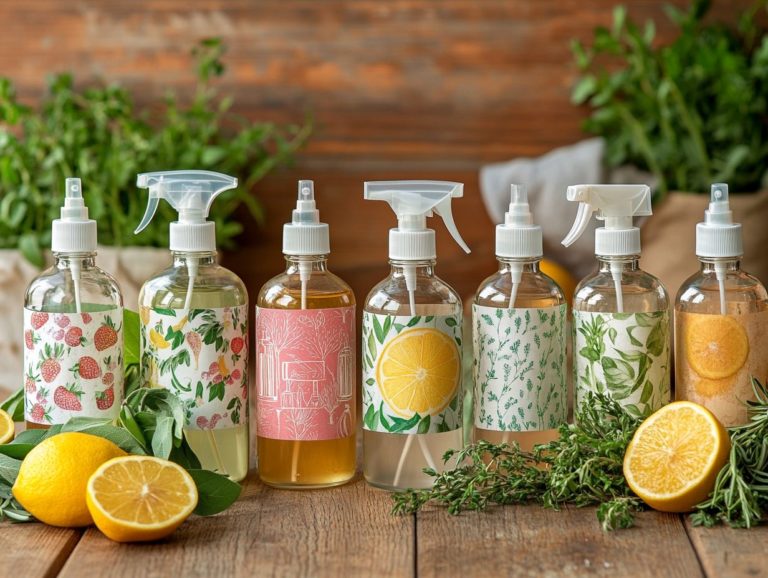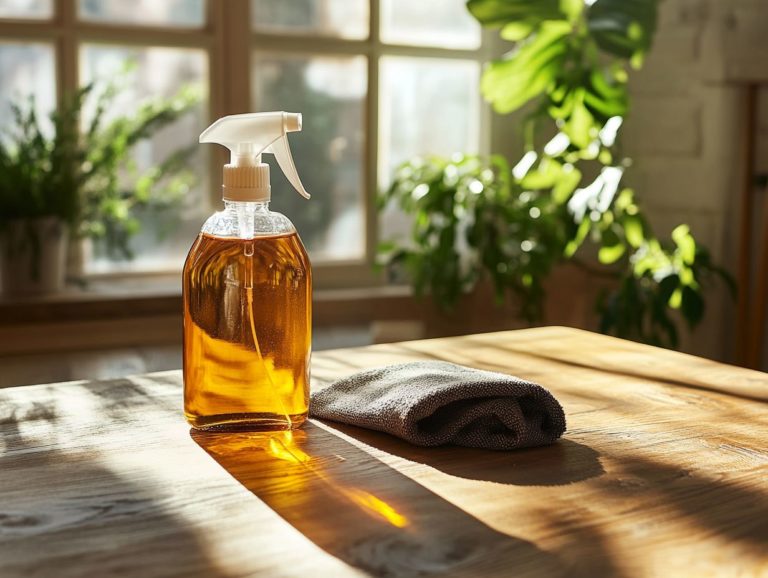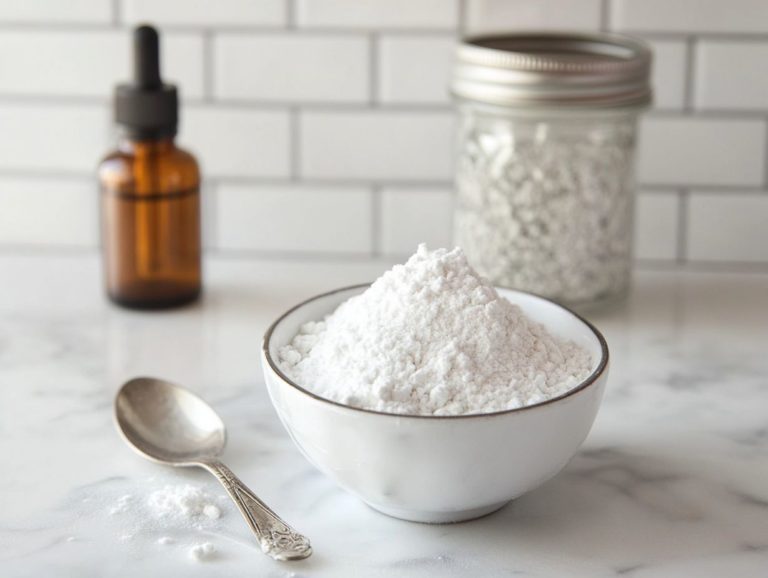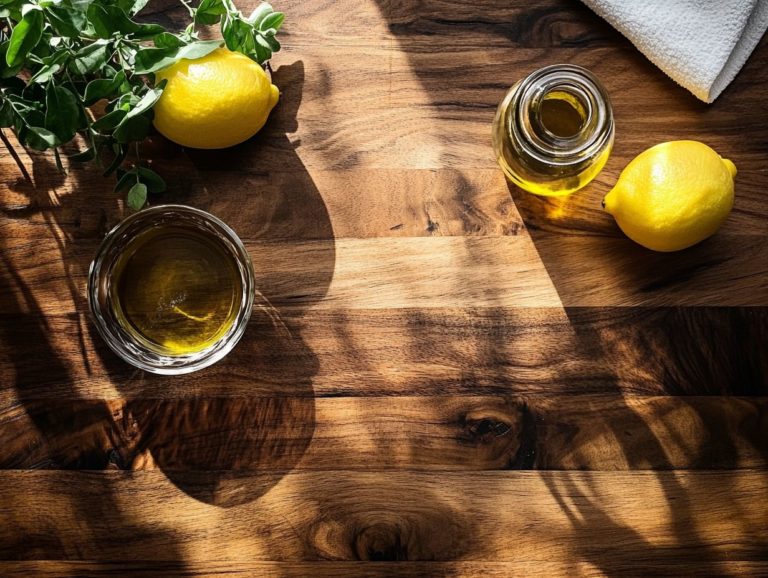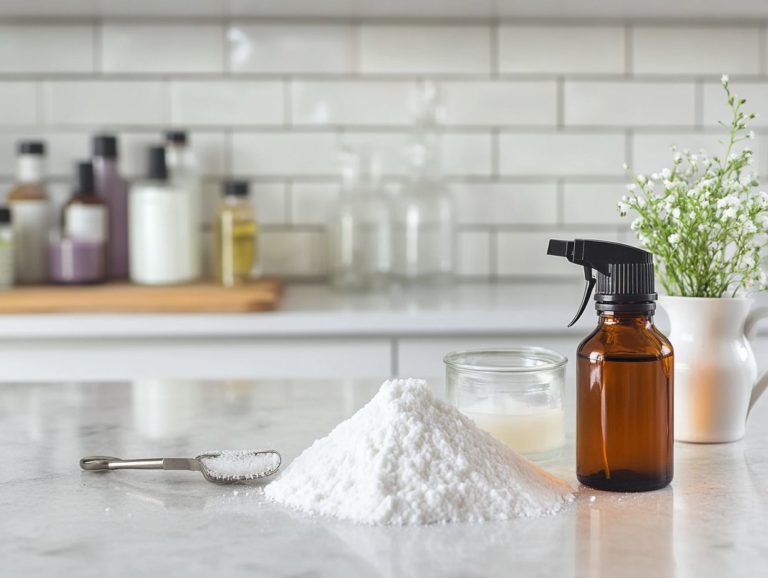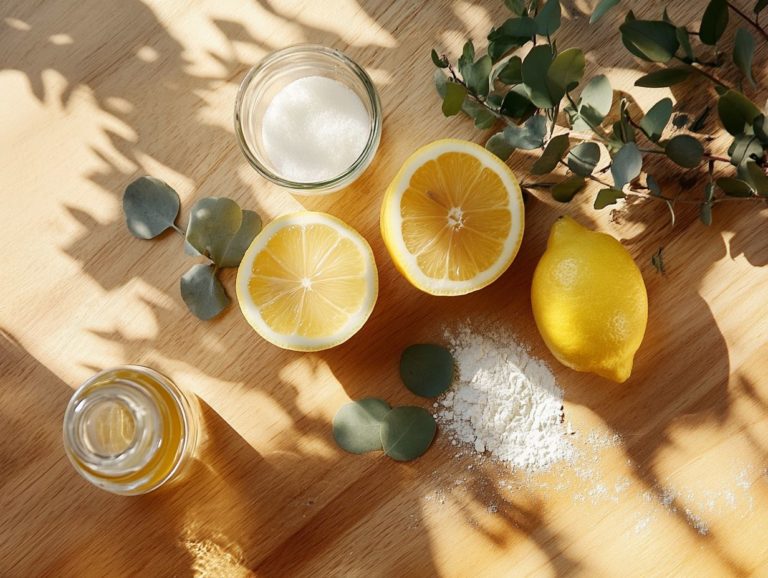5 Essential Tips for Homemade Cleaner Makers
In today s world, you may find yourself seeking greener alternatives for household cleaning. By making your own cleaners, you not only reduce your reliance on chemical-laden products but also gain the ability to customize solutions that cater perfectly to your specific needs.
This article offers five essential tips for crafting effective homemade cleaners, guiding you from selecting natural ingredients to ensuring proper storage. You will uncover the myriad benefits of DIY cleaning solutions, explore common ingredient recipes, and learn vital safety precautions to keep in mind.
Don t miss out on these easy tips that can revolutionize your cleaning routine today!
Contents
- Key Takeaways:
- 1. Use Natural Ingredients
- 2. Research the Properties of Each Ingredient
- 3. Clean and Disinfect Containers and Tools
- 4. Label and Date Your Homemade Cleaners
- 5. Store in a Cool, Dry Place
- Why Make Your Own Cleaners?
- What Are the Benefits of Using Homemade Cleaners?
- What Are Some Common Ingredients Used in Homemade Cleaners?
- What Are Some Recipes for Effective Homemade Cleaners?
- How Can You Customize Homemade Cleaners for Different Surfaces?
- What Are Some Safety Precautions to Keep in Mind When Making Homemade Cleaners?
- Frequently Asked Questions
- What are the 5 essential tips for homemade cleaner makers?
- Why is it important to use natural ingredients when making homemade cleaners?
- Do I need to follow a recipe when making homemade cleaners?
- How should homemade cleaners be stored?
- Why is it important to label homemade cleaners?
- Are there any safety precautions I should take when using homemade cleaners?
Key Takeaways:
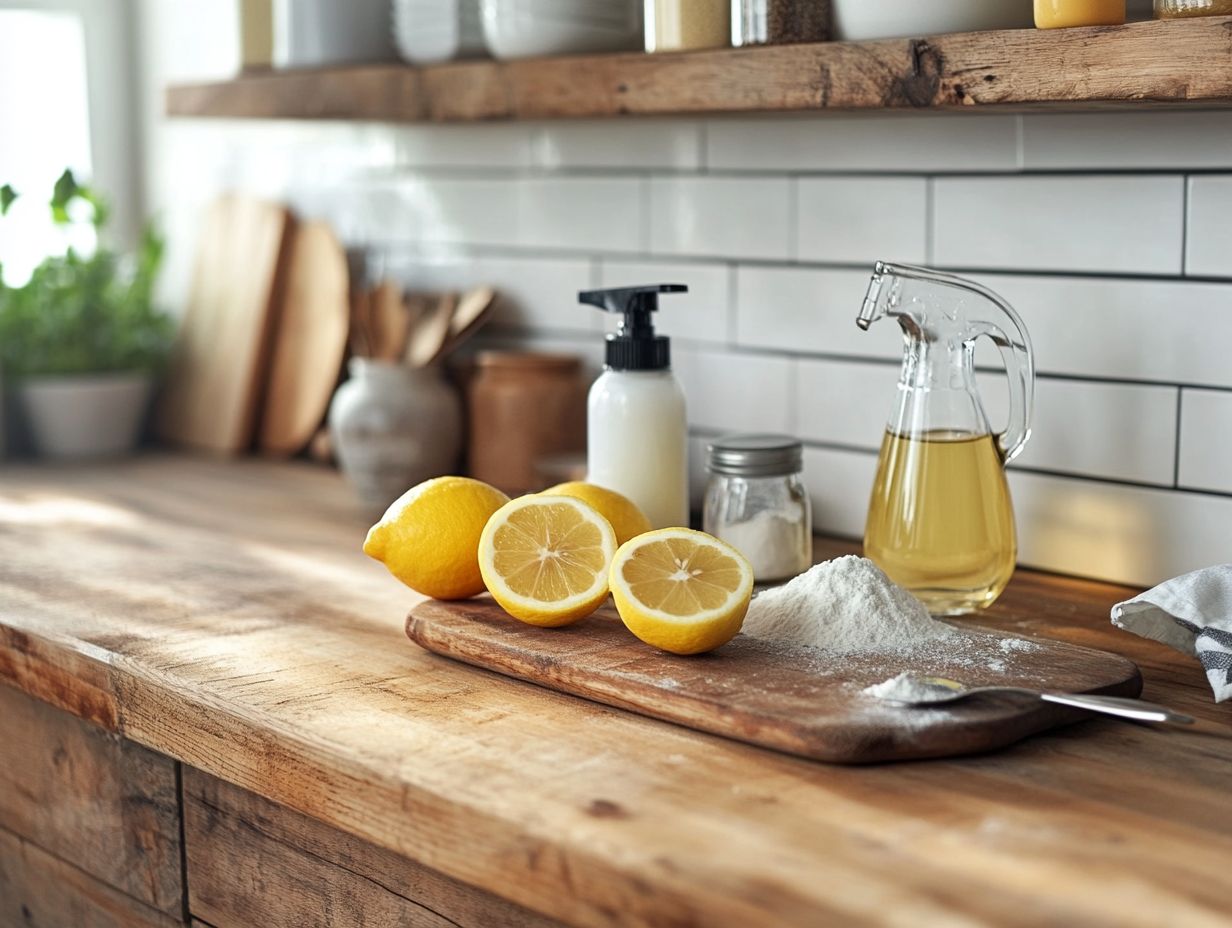
- Using natural ingredients is essential for creating effective and eco-friendly homemade cleaners.
- Research each ingredient to understand how it will work in your cleaner.
- Clean and disinfect your containers and tools to ensure your homemade cleaner is effective.
1. Use Natural Ingredients
Using natural ingredients in your homemade cleaning sprays boosts their effectiveness and fosters a healthier environment, free from potentially harmful chemicals.
Ingredients like white vinegar, baking soda, and essential oils effectively tackle tough stains and odors while being safe for your family and pets.
By incorporating common household items such as dish soap and rubbing alcohol into your cleaning solutions, you can create powerful DIY cleaners that work wonders on various surfaces, including natural stone, without causing damage or leaving harmful residues.
These natural components allow you to craft simple yet effective recipes that rival commercial offerings. For example, combining equal parts vinegar and water creates a potent glass cleaner that leaves no streaks. A paste made from baking soda and water works wonders for scrubbing stubborn grime off surfaces.
Essential oils like tea tree and lavender add refreshing scents and infuse your cleaners with antibacterial properties, enhancing their overall effectiveness. This sustainable approach not only reduces waste but also helps you manage household cleanliness safely and efficiently.
2. Research the Properties of Each Ingredient
Understanding each ingredient’s properties is key to formulating your homemade cleaning sprays. This knowledge helps you create effective and safe cleaning solutions tailored to your needs.
Take baking soda, for example; it’s a fantastic natural abrasive that excels at removing stubborn stains and odors with its gentle scrubbing action. White vinegar, known for its high acidity, works wonders in dissolving mineral deposits and cutting through grease.
Both ingredients are safe, but handle them with care wearing gloves during mixing helps avoid skin irritation.
When incorporating essential oils like tea tree or lavender, choose those with antibacterial properties for maximum effectiveness. Selecting the right ingredients based on the surfaces you’re cleaning will further enhance your results, ensuring a safer and healthier home for everyone.
3. Clean and Disinfect Containers and Tools
Before using your homemade cleaning sprays, take a moment to clean and disinfect all your containers and tools. This step prevents mixing different cleaning agents that can reduce their effectiveness.
Cleaning your containers plays an essential role in helping your cleaning agents perform at their best. Start by rinsing the container with warm water to wash away any leftover substances.
Next, use a gentle scrub brush or sponge with some dish soap to clean both the interior and exterior surfaces, paying special attention to those crevices where grime loves to hide.
After rinsing with fresh water, sanitize the container using a mixture of 70% isopropyl alcohol or a diluted bleach solution. Don t forget about your tools funnels and measuring cups should be cleaned similarly. If using plastic containers, choose disinfectants labeled as safe for that material to avoid damage.
Ready to start making your own cleaners? Try these tips and share your experiences!
4. Label and Date Your Homemade Cleaners
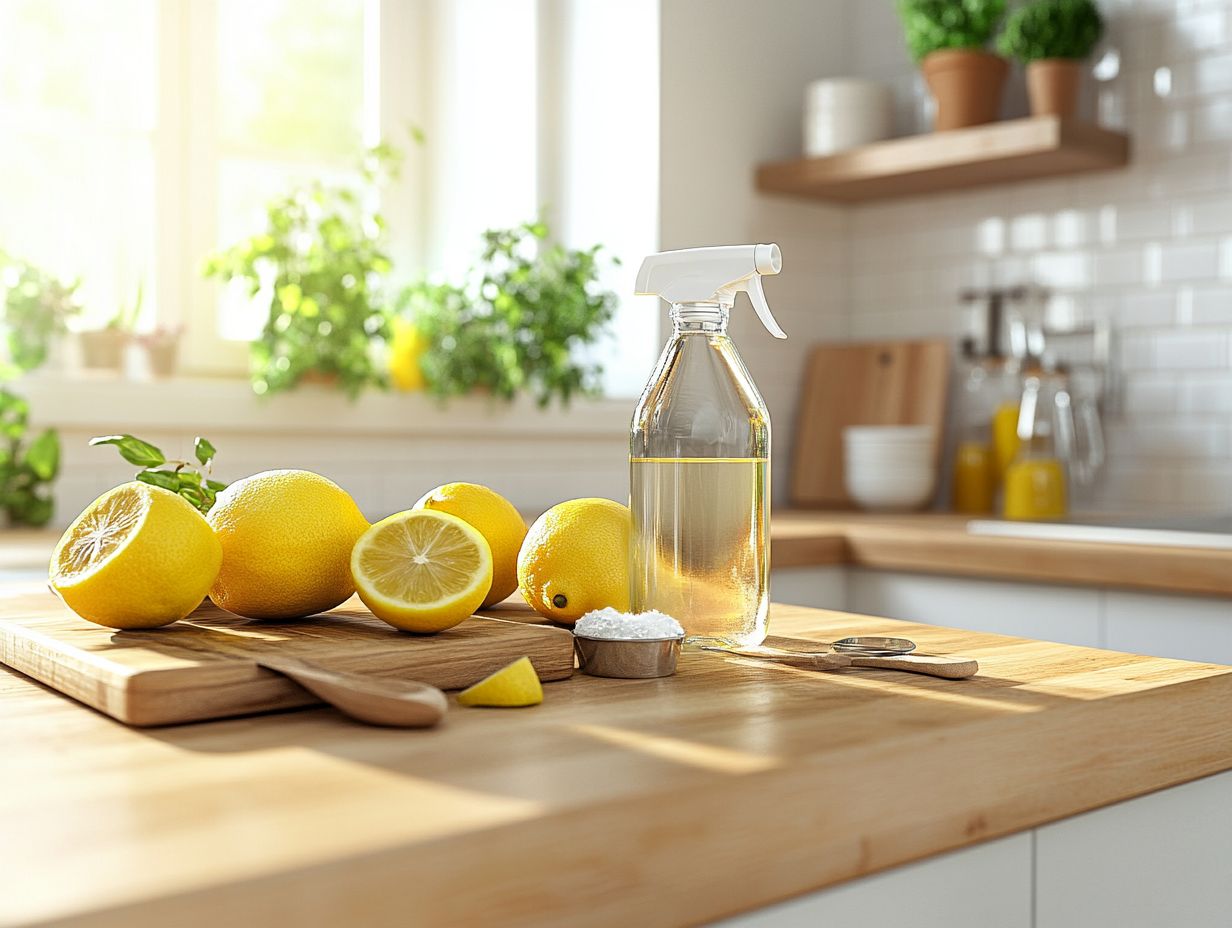
Labeling and dating your homemade cleaners is not just a good idea; it s an essential practice that maximizes efficiency, ensures safety, and guarantees proper use over time.
By clearly marking the ingredients on the label, you quickly identify potential allergens or irritants and select the right cleaner for the intended surface.
Including the creation date helps you track freshness, ensuring that each solution remains at its peak effectiveness.
Specify the intended use for each cleaner whether it s for glass, wood, or tackling specific stains to enhance your overall experience.
Regularly monitoring expiration dates is vital since expired solutions may lose their cleaning efficacy or become hazardous.
Proper storage practices, like keeping your cleaners in cool, dark locations out of reach of children, can significantly extend their shelf life and maintain safety during use.
5. Store in a Cool, Dry Place
Properly storing your homemade cleaning sprays is essential for maintaining their effectiveness and ensuring safety.
A cool, dry place is the perfect environment for your cleaning solutions, preventing degradation of ingredients that can result from temperature fluctuations.
Keep these cleaners out of direct sunlight, as UV rays can break down vital components and diminish their cleaning power.
To enhance their longevity, opt for opaque glass or high-quality plastic spray bottles.
Using containers that seal tightly will help prevent contamination and extend shelf life.
The right storage conditions not only preserve the integrity of these eco-friendly cleaners but also ensure they remain safe for your household.
Why Make Your Own Cleaners?
Making your own cleaning products empowers you to control what enters your home, ensuring your cleaning solutions are effective and free from harmful chemicals often found in commercial products.
By crafting homemade cleaning sprays with natural ingredients like baking soda, white vinegar, and essential oils, you can personalize your cleaning recipes to match your family s specific needs.
DIY cleaners are typically more cost-effective and environmentally friendly, helping to reduce waste and promote sustainability in your household.
Homemade cleaning products allow you to customize formulations and significantly decrease your household expenses.
Experts like Carolyn Fort from the Good Housekeeping Institute reveal that making your own cleaning solutions can save you nearly 70% compared to buying off-the-shelf cleaners.
These natural alternatives also lessen the environmental impact by cutting down on plastic waste and minimizing harmful chemical runoff into our waterways.
In a marketplace flooded with store-bought products containing toxic ingredients, embracing DIY cleaning solutions fosters a healthier lifestyle and contributes to a more sustainable future for our planet.
What Are the Benefits of Using Homemade Cleaners?
Using homemade cleaners offers a wealth of advantages, such as enhanced safety for your family and decreased exposure to harsh chemicals.
Many of the ingredients you need are likely already in your pantry think vinegar, baking soda, and essential oils.
For example, a family in Oregon discovered they could slash their cleaning supply expenses by nearly 50% simply by creating their own all-purpose spray.
The beauty of this approach lies in its customization; you can experiment with different scents and formulas to create a cleaning experience that s uniquely yours.
Your decision to use homemade cleaners contributes positively to the environment by minimizing plastic waste and reducing reliance on industrial production.
Small changes in your cleaning routine can lead to a healthier planet for future generations.
Start making your homemade cleaners today for a healthier home and planet!
What Are Some Common Ingredients Used in Homemade Cleaners?
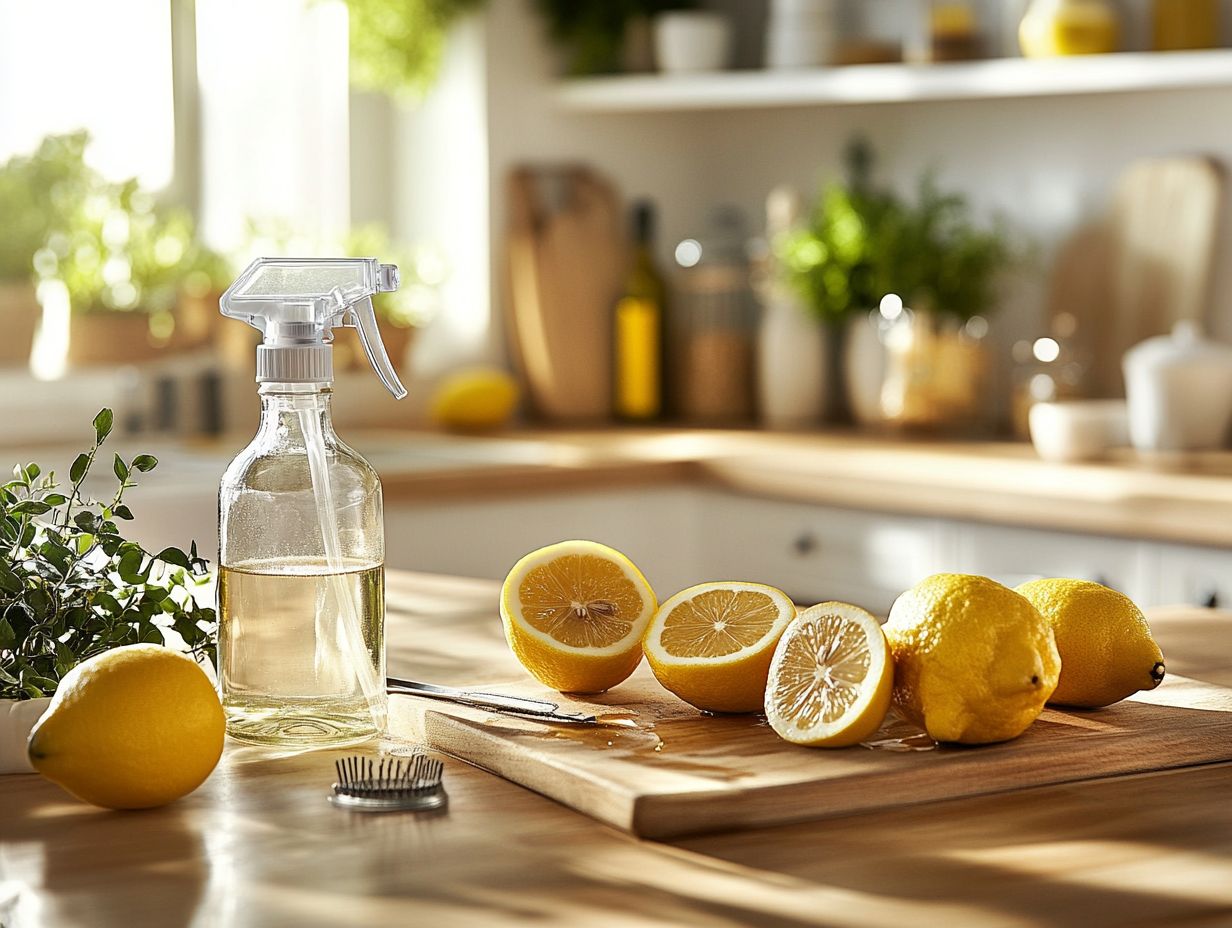
Your homemade cleaners can include useful items like white vinegar, baking soda, essential oils, dish soap, and rubbing alcohol. Each ingredient brings unique qualities to your cleaning recipes.
These ingredients tackle a wide range of stains and odors. They provide a more eco-friendly alternative to many commercial cleaning products loaded with harsh chemicals.
White vinegar cuts through grease and eliminates mildew. It s a must-have for your kitchen and bathroom cleaning.
Baking soda is a mild scrub that helps clean without scratching. Essential oils add a delightful aroma and boost antibacterial properties, enhancing your cleaning solutions.
Rubbing alcohol is excellent for disinfecting surfaces and works wonders as a streak-free cleaner for glass and windows. You can find these ingredients at your local grocery store or health food shop.
Mixing the components in the right ratios is key to maximizing their effectiveness. Follow tried-and-true cleaning recipes for the best results.
What Are Some Recipes for Effective Homemade Cleaners?
Creating effective homemade cleaners is fun and rewarding! You can make all-purpose cleaners, glass cleaners, and air freshener sprays using everyday household ingredients.
With just a dash of creativity and a handful of staple pantry items, you can craft solutions that rival those store-bought products minus the harmful chemicals. For example, a mixture of cleaning vinegar, baking soda, and essential oils can tackle even the toughest grease stains.
A blend of water and lemon juice effortlessly combats odors. These DIY recipes save you money and allow you to tailor your cleaning supplies to your preferences.
From freshening your upholstery to achieving a streak-free shine on your windows, homemade cleaners can handle many common household challenges with ease. For instance, create a natural stone cleaner with gentle ingredients to safely clean granite countertops.
How Can You Customize Homemade Cleaners for Different Surfaces?
Customizing your homemade cleaners for different surfaces is essential for effective cleaning. Certain ingredients excel on specific materials, whether you re tackling natural stone or stubborn grease.
A grease cleaner made with dish soap and baking soda paste effectively cuts through the toughest kitchen grime. Understanding the unique characteristics of each surface elevates your cleaning process.
When faced with granite countertops, a mixture of warm water, mild dish soap, and a splash of vinegar works wonders, breaking down grime without dulling the stone’s natural sheen.
For tough grease on metal surfaces, a robust solution, such as a baking soda paste mixed with water, offers an abrasive yet safe clean. Using microfiber cloths helps achieve a streak-free finish.
Adjusting the ratios of these ingredients allows you to achieve optimal results while safeguarding the surfaces you cherish.
What Are Some Safety Precautions to Keep in Mind When Making Homemade Cleaners?
When crafting your own homemade cleaners, prioritizing safety precautions is essential for a secure and effective cleaning experience. This is particularly important when working with strong ingredients like rubbing alcohol, hydrogen peroxide, or essential oils.
Make proper ventilation a top priority to prevent inhaling potentially harmful fumes, especially when mixing various substances like ammonia or chlorine bleach. It’s also wise to wear gloves to protect your skin from irritation, particularly when handling acidic or caustic ingredients.
Ensuring safe storage practices is crucial. Always keep your cleaning solutions in clearly labeled containers, out of the reach of children and pets. Familiarize yourself with the specific hazards of the materials you’re using, such as the flammability of rubbing alcohol or the risk of allergic reactions from certain essential oils. This knowledge will enable you to take the necessary precautions for a safer and more effective cleaning process.
Incorporate safety tips from experts like Carolyn Fort from the Good Housekeeping Institute to further enhance your approach.
Frequently Asked Questions
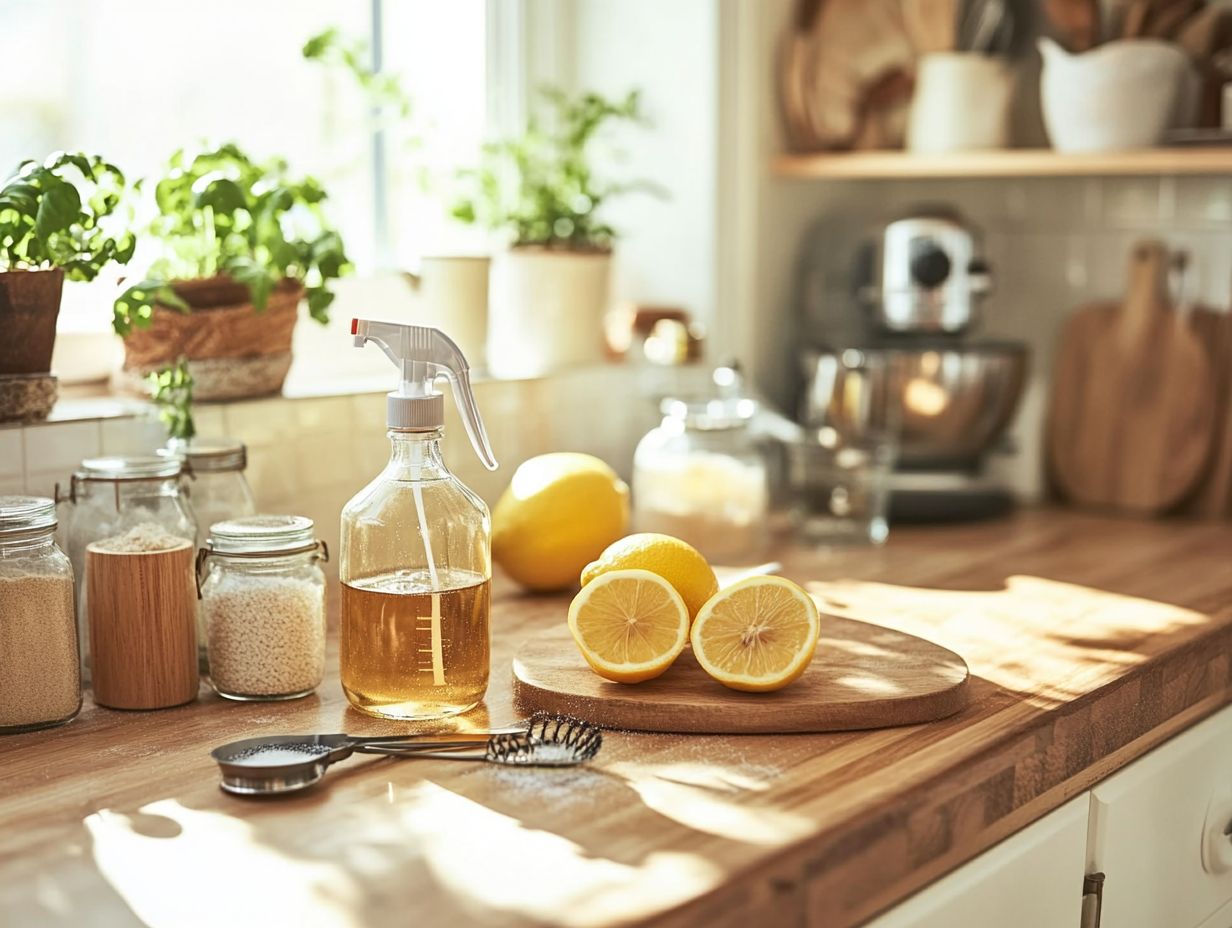
Contributors: Carolyn Fort , Lauren, Alyssa Gautieri
What are the 5 essential tips for homemade cleaner makers?
The 5 essential tips for homemade cleaner makers are: using natural ingredients, following a recipe, properly storing the cleaner, labeling the cleaner, and using the cleaner safely.
Additional cleaning tips include using microfiber cloths for streak-free finishes and experimenting with different essential oils for varied scents.
Why is it important to use natural ingredients when making homemade cleaners?
Using natural ingredients ensures that the cleaner is safe for your family and the environment. It also reduces the risk of harsh chemicals damaging surfaces or causing health issues. Natural alternatives like Castile soap and lemon rind can be both effective and gentle.
Do I need to follow a recipe when making homemade cleaners?
Yes, following a recipe is important to ensure the right balance of ingredients and the effectiveness of the cleaner. Mixing random ingredients can lead to an ineffective or potentially harmful cleaner. Specific recipes for different needs, such as a carpet stain cleaner or an air freshener, ensure targeted effectiveness.
How should homemade cleaners be stored?
Homemade cleaners should be stored in airtight containers and kept in a cool, dark place. Storing them correctly keeps your cleaners super effective and helps prevent any potential spills or accidents. Incorporating rosemary sprigs in storage can add a natural preservative effect.
Why is it important to label homemade cleaners?
Labeling homemade cleaners is crucial for safety purposes, keeping track of the ingredients used and the purpose of the cleaner. This practice also helps prevent confusion or accidental misuse. Labels should include specific safety tips, such as avoiding the combination of ammonia and chlorine bleach.
Are there any safety precautions I should take when using homemade cleaners?
Yes, always use caution when handling homemade cleaners. This includes wearing gloves and protective eyewear when necessary, avoiding the mixing of certain ingredients, and properly diluting the cleaner before use. When using hydrogen peroxide, ensure it is stored in a dark container to maintain its effectiveness.
Ready to make your own cleaners? Get started today with these tips!

